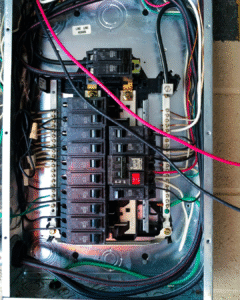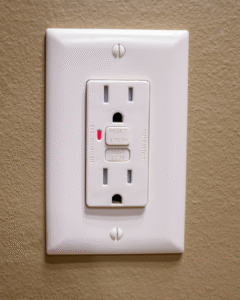Common Electrical Findings During a Home Inspection: Insights from Premier Home Inspection’s Team Training with S&L Electric
Electrical systems are one of the most critical components evaluated during a home inspection. Even seemingly minor issues can pose major risks—from fire safety concerns to costly repairs. Recently, our team participated in an electrical training session led by Mitchell Boshers, owner of S&L Electric, a third-generation licensed electrician. His insight helped reinforce the importance of recognizing and understanding common electrical findings during a home inspection.
1. Electrical Panel Evaluation

The electrical panel is the heart of a home’s power system. During an inspection, we assess:
-
Meter Connection: Ensuring a secure and properly installed connection.
-
Discoloration: Rust, corrosion, or burn marks may indicate overheating or moisture intrusion.
-
Breaker Uniformity: Panels should contain matching breaker brands and types; mismatched components may be unsafe.
-
GFCI & AFCI Breakers: These safety features are checked for proper installation and functionality.
2. GFCI Placement & Functionality
Ground Fault Circuit Interrupters (GFCIs) are required in areas where electricity and water could come into contact, such as:
-
Kitchens
-
Bathrooms
-
Garages
-
Unfinished basements
-
Laundry rooms
-
Exterior outlets
 During the inspection, we verify correct placement, test their operation, and look for signs of wear, including discoloration or loose plugs.
During the inspection, we verify correct placement, test their operation, and look for signs of wear, including discoloration or loose plugs.3. Outlet Testing
Outlets are tested for:
-
Loose Connections: Outlets that don’t hold plugs securely are flagged for safety.
-
Discoloration: Dark marks or burns may indicate overheating or arcing.
-
Proper GFCI Protection: Especially in locations where required by code.
-
Overall Safety: Wiring issues like reversed polarity or missing grounding are checked.
4. Switches & Lighting
Lighting and switch systems are inspected for:
-
Age & Wear: Older switches may not meet safety standards.
-
Functionality: All switches are tested to ensure proper operation.
-
Light Fixtures: Inspections include looking for exposed wires, missing covers, and secure mounting.
-
Discoloration: Evidence of overheating or electrical stress is noted.
5. Smoke Detector Safety
Smoke detectors play a critical role in home safety. During inspections, we:
-
Check the manufacture date (detectors should be replaced every 8-10 years).
-
Test for functionality, especially in interconnected systems.
-
Confirm the power source (battery, hardwired, or combination).
6. Exhaust Fans & HVAC Electrical Safety
These components are essential for ventilation and comfort. We evaluate:
-
Bathroom Exhaust Fans: Ensuring proper venting to the exterior, not into attic spaces and for potential fire hazards from dust and debris
-
HVAC Units: Checking for secure disconnects, safe wiring, and evidence of damage or corrosion.

7. Water Heater Electrical Safety
If the home has an electric water heater, we inspect:
-
Wiring Condition: Ensuring secure and properly rated wires.
-
Breaker & Disconnects: Verifying proper protection.
-
Bonding & Grounding: Ensuring proper grounding is in place.
8. Outdoor Electrical Outlets
Outdoor outlets are exposed to weather, so we assess:
-
GFCI Protection: Required for all exterior outlets.
-
Weatherproof Covers: Especially bubble-style covers for in-use protection.
-
Functionality & Mounting: Checking for loose boxes, corrosion, and power delivery.
9. Exterior Panels & Grounding
We inspect exterior service panels for:
-
Panel Integrity: Signs of rust, pest activity, or moisture damage.
-
Ground Rods & Wires: Confirming proper installation and condition.
-
Service Mast or Conduit: Ensuring it’s securely attached and not deteriorated.
Why This Matters
Electrical issues may not be immediately visible, but they’re among the most important safety concerns in a home. Many problems are preventable and fixable—but only if identified early. A professional inspection provides peace of mind and helps you make informed and confident decisions, whether you’re buying, selling, or maintaining your home.
Premier Home Inspection is proud to offer thorough, detailed inspections—enhanced by ongoing training and collaboration with trusted professionals like S&L Electric.
Need electrical work after your inspection?
Contact S&L Electric at www.sandlelectric.us or call 629-259-7373 for licensed, local service.
Schedule your inspection today and gain confidence in the safety and reliability of your home’s electrical system.


